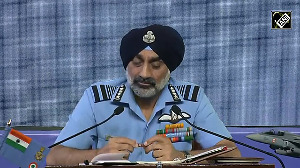Terming the Indo-US nuclear deal as a 'crowning achievement' for the US, the Senators, appointed to thrash out the language of the final legislation to implement the deal, have said that the agreement was important for promoting greater regional and international security.
"This legislation is a cornerstone of the President George W Bush's vision for a new strategic partnership between the United States and India that will promote greater regional and international stability," Chairman of the House International Relations Committee Henry Hyde said at the start of a manager's meeting of the conference committee of the two chambers on Tuesday evening.
In the first formal meeting of the conferees of the House and the Senate, Hyde announced that the staffers are close to an agreement.
"The Bills were not too far apart to begin with," the Illinois Democrat said.
Hyde also hoped that the close relationship between India and the US will also contribute to stability in South Asia.
"It is our hope that this closer relationship will contribute significantly to stability in South Asia, the Indian Ocean basin and the international system as a whole," Hyde said in the presence of other senior Mangers like Senate Foreign Relations Committee Chairman Richard Lugar and House International Relations Committee Ranking Member Tom Lantos.
"This strategic partnership envisions expanded cooperation across a broad range of subjects. The cooperation in civil nuclear energy it enables will greatly enhance India's capacity to produce the energy needed by its rapidly growing economy," Hyde added.
At the start of the Senate session on Tuesday, Majority Leader Bill Frist announced that the Conferees will have to conclude work on this 'very important piece of legislation' to implement the agreement between India and the United States.
"This morning I talked to the Prime Minister of India who underscored the importance of this legislation," Frist said in his opening Statement on the floor of the Senate.
"This legislation will also contribute to our shared goals of strengthening global non proliferation regimes especially by enhancing cooperation to prevent Iran from acquiring the capacity to produce nuclear weapons," Hyde said.
He also expressed confidence that the new relationship between India and the United States that has already begun to take shape will endure 'far into the future.' The civilian nuclear agreement will be called the 'Henry J Hyde United States-India Peaceful Atomic Energy Cooperation Act of 2006.'
Announcing this, current ranking member of the House International Relations Committee and incoming chair of that panel Tom Lantos remarked: "No legislation has ever been more appropriately labelled."
Lantos stressed that the bill is immensely important to world peace, global security and economic development. "The conference report will advance our common interests with India as also striking the right balance in law and in preservation of Congressional prerogatives," he said.
"We all understand the time frame but we understand the importance of the relationship we are forging between India and the United States," the Senator from Indiana remarked, adding: "This is a crowning achievement for our country, our Committees, our Congressional system. It is one of the few conspicuous successes of any legislative activity in this Congress,but especially an important one given the gravity of affairs in the world and the importance of our friendship and relationship with India."





